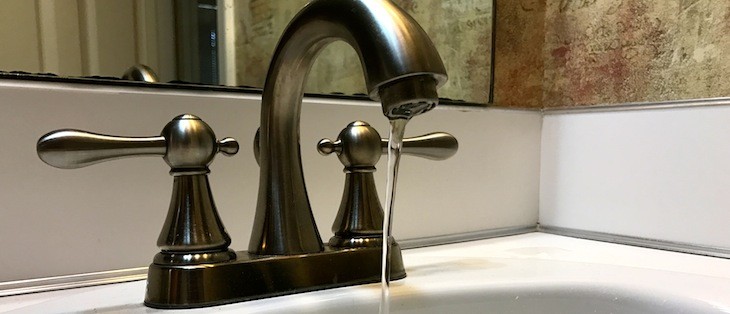New meters could boost Fort Smith water bills by an average 21.3% next year
by October 10, 2017 4:23 pm 2,159 views

Approximately one in four water customers in the city of Fort Smith could soon see an average increase of 21.3% on their water bills. Fort Smith Utilities Director Jerry Walters explained at a Tuesday (Oct. 10) Board of Directors study session that a sizable portion of the city’s water meters had exceeded their recommended 10-year lifespans.
In total, the city services 36,589 meters. From these, roughly 16,800 had exceeded their normal life expectancy (45.91%) with 9,500 of those (25.96% of the total) more than 20 years old.
“As a meter ages, the internal parts of the meter begin to degrade and the accuracy of the water meter declines, becoming less sensitive to flow. Most of the time this leads to the water meter under reading the amount of water that passes through the meter,” Walters said, adding that meters removed and tested from the Fort Smith water system ranging in size of 5/8-inch to 1-inch “have shown to read an average of 21.3% lower usage than the actual amount of water passing through the meter. Some water meters actually registered no water flow through the meter.”
Walters continued: “This means that approximately 21.3% of the water provided was not accounted for and the customer was not billed for their full water use, and in some cases, any of the water they used.”
The city’s utilities department is in the process of replacing all of the water meters within city limits “to ensure they are properly measuring the water that flows through them,” Walters said, adding “As these water meters are replaced, they are being installed with an automated meter reading (AMR) system. This will allow more information to be collected and nearly eliminates human error during meter reading.”
Walters told Talk Business & Politics after the study session that some customers will notice an increase in their water and sewer bills as meter replacements are made, but this is due “to an accurate measurement of the water usage, and the bill reflecting the actual water and wastewater use of the customer.”
Walters also said he expects the largest increases to be on the aforementioned 9,500 meters that have exceeded 20 years in operation. The additional 7,300 that have outlived the recommended 10 years (19.95% of the city’s total metered population) will likely see smaller increases, but Walters acknowledged he would not know for certain whether the meter replacement schedule will result in that overall 21.3% revenue increase until he finishes measuring data over the next year.
City Directors Don Hutchings and George Catsavis acknowledged that while the increasing costs were not a formal increase in prices, they were likely to “cause an uproar,” Hutchings said. Catsavis took a harder tack, noting there is “another side to that story” when it came to residents getting free water.
“With the consent decree, if they’re getting free water, more power to them,” Catsavis said. “People are struggling as it is, but now we’re saying, we’re going to increase your water bill 20% … so if your bill is $100, it’s now going to be $120.”
Director Mike Lorenz approached Catsavis from another perspective.
“Let’s assume that 20% of the meters out there are under reporting. That means 7,200 people are not paying for all the water they use while another 28,000 are paying for it.”
“If it wasn’t for the consent decree, I’d say fine. But under the circumstances, I think this needs to be put off and do it on a case-by-case basis if the meter’s bad. But to do this to the people right now, I just can’t see it,” Catsavis said.
Director Tracy Pennartz said she recently had her water meter replaced and had not seen a significant increase in her bill. “But I think it’s only just and fair to all water users that each water user pay their fair share of what they’re using, and if the mechanics of what we’re using to measure that are inaccurate … then it’s not fair to all the other people who are paying 100 percent. It’s just prudent to improve your infrastructure on your water meters over time. They wear out because of friction and their mechanicals.”
Catsavis agreed, but said he could not support a full implementation “until our City Administrator can renegotiate this consent decree so we can get our water bills back down.” Catsavis had to leave the meeting early but joked on the way out he had to go “take my address off my house, so you don’t know where my water meter is.”
